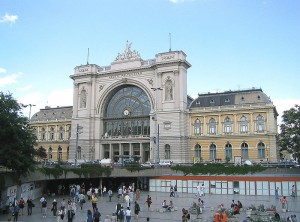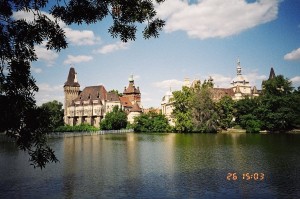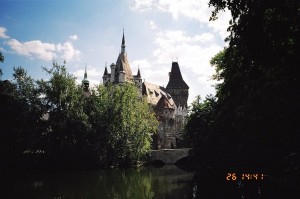For however long I am meant to reside here in Budapest, Hungary, a post-Communist city with an incredible history, I feel compelled to explore both its past and present. I’d like to share some of my experiences with you, if you care to follow along. But first, I’ll start with a trip outside the city—my journey to the Auschwitz-Birkenau death camp near Krakow, Poland:
 A few days after my friend Bette arrived from Texas for a three week visit, we boarded a train to Krakow from the Keleti Train Station in Budapest. The station, built in 1881, and considered the most lavish station in Europe at the time, is still beautiful today. How novel, I thought—a slumber party aboard a sleeper train, and we’ll arrive first thing in the morning, fresh and ready to explore the city and its surroundings.
A few days after my friend Bette arrived from Texas for a three week visit, we boarded a train to Krakow from the Keleti Train Station in Budapest. The station, built in 1881, and considered the most lavish station in Europe at the time, is still beautiful today. How novel, I thought—a slumber party aboard a sleeper train, and we’ll arrive first thing in the morning, fresh and ready to explore the city and its surroundings.
I should have known the train’s compartments would be less than anticipated when I spied small Cyrillic lettering on the corners of the cars indicating they were Russian made—aha, Communist era. I was right. Not those lovely beds across from one another you see in the movies, but narrow bunks stacked in a cramped compartment barely large enough for one.
I got the top bunk.
Near dusk, and about an hour outside of Budapest, a sweet scent of roses enveloped us. Bushes laden with lush, powdery-pink blooms appeared for miles beside the tracks, so thick it seemed as though delicate, tinted clouds had fallen from the sky. I have never seen such a sight. We closed our eyes and breathed in the intoxicating perfume that swept through the train, feeling as though we floated on a fragrance created exclusively for us.
Then a jarring thought gripped me: My God, we’re riding the very rails that carried Jews, Gypsies, and political prisoners to Auschwitz and Birkenau! Hundreds of thousands of innocents on their way to their deaths. Hundreds of people packed in each car—women, men and children cramped so tightly together they were forced to stand the entire trip with no food, water or toilets. Even the dead and dying could not fall in the crush. Suddenly, the small compartment we occupied didn’t seem so cramped.
And what of the roses? Had these fragrant flowers lined the tracks back then? After all, wild roses can regenerate for decades. I choked back tears, and turned to Bette whose countenance told me she held similar thoughts. 
“Do we really want to visit Auschwitz?” I asked her.
We grew silent for a long while as we gazed at the blur of pink, and breathed a scent no longer light and sweet, but suddenly heavy and funereal. Then, strange as it may seem, we came to the conclusion that we wanted to honor those who traveled these tracks before us by remaining focused on their plight during our train ride, and commit to visiting the camps upon our arrival. What would our decision produce? Would it heal any lost souls? Would it heal us? We didn’t know, but we felt fractured, scarred by the past, and compelled to see our journey through to the end.
Eventually, we left the roses behind and we traveled for a long while beside a lovely river. We didn’t know which river, but the countryside was beautiful, bucolic. I wondered: The farmers who lived alongside this lazy river back then, the people in these tiny villages, did they know what horrors the trains carried?
Had anyone realized they were death trains?
Had anyone ever wandered close enough to the tracks to hear any wailings?
Had there been any cries to even be heard by that stage of the journey? After all, the trains were nothing more than windowless cattle cars, their doors nailed shut once the people were packed inside, and the only light to be had was what seeped through cracks in the boards.
Dear God, how could this have happened?
While Bette did fairly well with sleeping in her little bunk, I slept fitfully. I awoke once feeling disoriented. For a moment, as the clickety-clack of wheels against rails filled my ears, I didn’t know if I was on a train some sixty six years ago or now. I felt like a dark-haired teenager, confused and wondering where we were going, and what and why everything was happening. It was almost as though I had inculcated a miasmic memory that still hovered above the tracks. I came fully awake feeling desolate. I could barely breathe. I curled up on the other end of the bed, next to the window, and gulped in fresh air until my racing heart found some semblance of normalcy.
But my mind refused to wander elsewhere.
Hundreds of thousands of people rode these very rails to their deaths. What were they thinking? How were they feeling? A great sob welled up in my chest, one that wouldn’t release—at least not yet.
Had the guards and engineers aboard those trains known what was happening? Had they known these people were to be worked until they dropped or gassed within hours of arrival if they were too old, too young or infirm? Did they know that any twins or ‘little people’ aboard would be used for hideous experiments by the death camp’s macabre Dr. Josef Mengele, ironically known as The Angel of Death? Or were these people kept naive, only informed of their job and saw nothing beyond where the train stopped? I would tend to think so, since it would have compromised the Nazi program of creating an Aryan society of healthy blue-eyed blonds had word leaked out of what they were up to (I find it interesting that Hitler intended to create a blue-eyed, blond-haired Aryan society when he himself had brown hair and brown eyes and his mother was part Jewish).
Suddenly, I had a deep sense that for whatever reason, I was meant to ride this train, and I was meant to have these experiences. That I was meant to know and understand what the Hungarians have suffered through (Hungarian Jews comprised the greatest number sent to Auschwitz, but don’t forget the Gypsies and political prisoners—nuns, priests, businessmen, housewives—any Hungarian labeled a spy became a political prisoner to be gotten rid of). Somehow, I knew all of this was tied to my healing process with regard to the loss of my big-hearted German husband.
(Tomorrow: My visit to Auschwitz and the Terror Museum in Budapest)
What about you? Have you had any similar experiences or awakenings?



